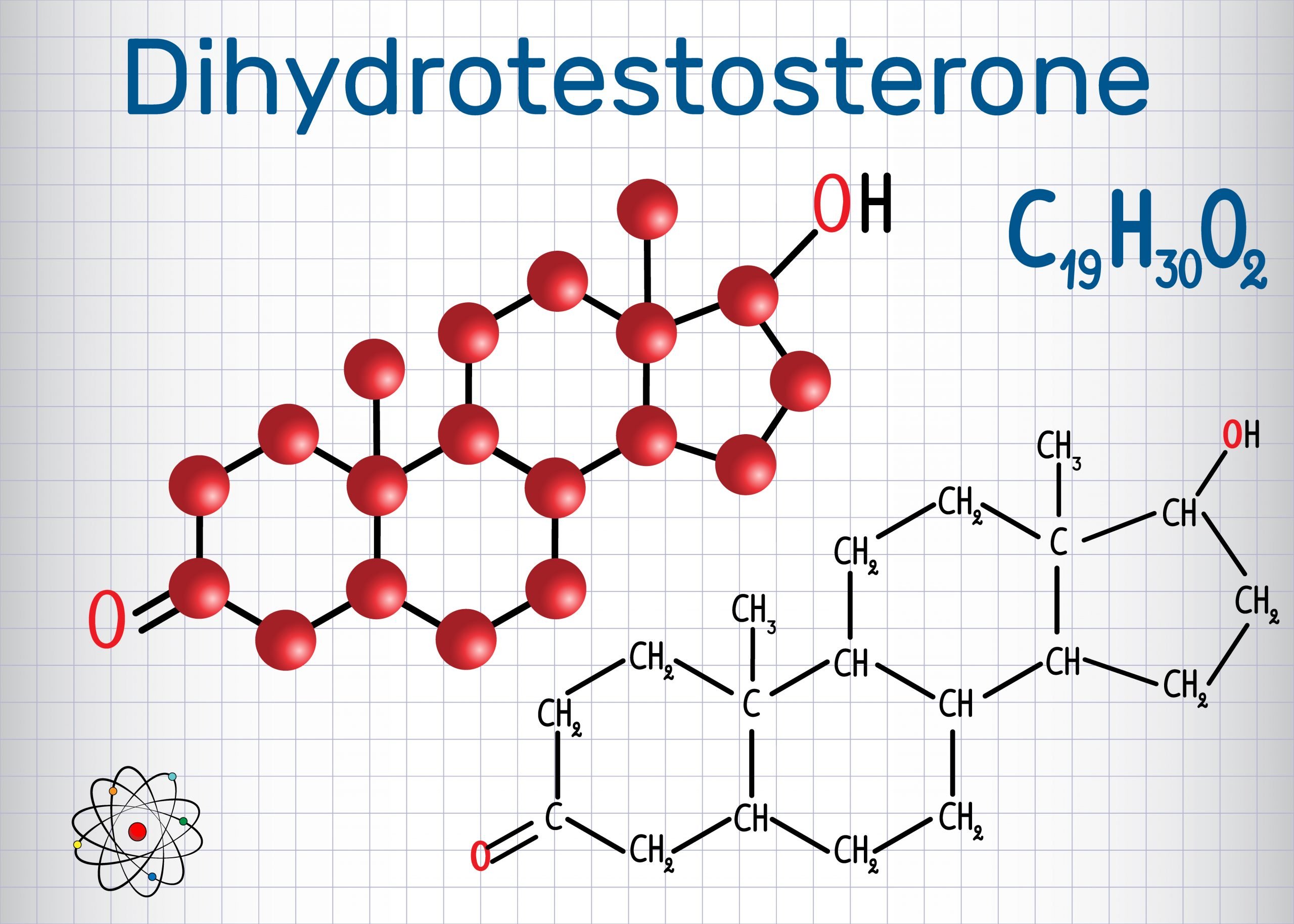
Page Contents
Hair loss by thyroid problems can be caused because of the malfunction of the T3 and T4, which are responsible for the healthy and strong follicles.
To understand the phenomenon, we have to probe deeper into the ingredients of these two hormones.
The question: Can hair loss be caused by Thyroid Problems can be answered when you understand the Hormones generated by the Thyroid glands and their functions. Then we proceed to what happens when they become deficient or excess.
The T3 and T4 hormones are made of silicon dioxide, cellulose, lactose monohydrate, Di-calcium phosphate, and the other ingredients.
They are responsible for prolonging the hair growth cycle and reducing the hair loss phase on the scalp. They suppress the hair growth inhibitor factors and promote natural hair re-growth.
Hypothyroidism induces diffuse hair loss by increasing the shedding and empty phases and suppressing the growth and regression phases. It’s stated to be the root cause of hair loss among men and women. The lost hair never grows again.
Can Hair Loss Be Caused By Thyroid Problems | The Human Hair and Thyroid Receptors

The hair follicles have TH-receptors (TH-Thyroid Hormone) for receiving the proteins and nutrients to grow and strengthen.
The stem cells get the required volume of keratin from the keratinocytes, which are promoted by the Thyroid hormone Receptor (TR) on the skin layer called the epidermis.
1. Human Hair Follicle
The hair follicle is the group of cells that surround the hair roots. It’s responsible for the hair growth cycle. It also shapes the texture of the hair, it’s color, curling, etc.
The TR strengthens the hair follicle through the supply of proteins and nutrients. The hair cycle happens normally without any significant variations. So, your hair sheds and re-grows without developing into baldness.
2. Dermal Fibroblasts
The dermal fibroblast is the connective tissue responsible for the processing of collagen protein. It’s also responsible for the increased blood circulation into the epithelial hair cells.
It promotes healthy hair growth and slows down the process of hair loss. That means your hair lifespan is increased by the collagen.
So, the fibroblasts act as the key factor of hair follicle regeneration and healthy growth of hair at the epidermis layer of the scalp.
3. Hair Matrix
The hair matrix is a complex structure around the follicles. It consists of the epithelial cells, color pigments, hair shaft, sebaceous gland, and the root sheath of the hair.
Hair Loss Geeks matrix is responsible for the strong roots and growth pattern of the hair on the scalp. The EGF growth of the Hair Follicles and its migration by promoting the growth and strengthening of the Outer-Root-Sheath (ORS).
Here, the growth (ANAGEN) phase of the hair is longer than the shedding of an empty phase. The hair matrix is connected to the EGF. In turn, the EGF is connected to the TR. And the TR is connected to the Thyroid hormones T3 and T4.
4. Thyroid-Stimulating Hormone (TSH)
TSH is the key hormone responsible for the production of thyroxin from the thyroid gland. It’s also responsible for the growth of the epithelial cells and strong EGF and TGF.
TSH promotes the hair follicles strength during the growth (ANAGEN) phase. Its key task is to extend the lifespan of the hair follicles by increasing the ANAGEN.
So, the hair shedding and the empty phases are reduced to the minimum period. It’s made possible by the strengthening of the ORS and the Connective Tissue Sheath (CTS).
The TSH also connects with the TR in the hair matrix for the circulation of proteins and vitamins required to promote hair growth and reduce hair loss.
Having seen the strong link between the TR and the hair growth & migration on the scalp, we proceed to learn how the imbalance (deficiency state called Hypothyroidism and the excess phase called the Hyperthyroidism) can affect the stability of the Hair Follicle (HF) and the hair matrix.
In this process of analysis, we also come across the extension of the regression, shedding and empty phases of the hair cycle. It predominates the growth phase. Hence, the state of hair loss remains almost permanent.
Will Hair Loss Due To Thyroid Grow Back?
EGF is another key parameter responsible for the growth of dense hair on the scalp along with the Transformation Growth factor (TGF). They play a critical role in the healthy growth and regeneration of hair.
When the androgens (male hormone responsible for growth factors) function undergoes a significant negative impact, the hair follicles enter shedding and empty phases earlier than the normal time (Connective Tissue Sheath).
It results in male pattern hair loss. Incidentally, the EGF and TGF are controlled by the TR. In most of the cases, the question of if hair loss due to thyroid will grow back may be negative when it comes to EGF.
Can a Thyroid Problem Cause Hair Loss

There are two forms of abnormal thyroid problem:
- Hypothyroidism
- Hyperthyroidism
The answer to the question can a Thyroid Problem cause Hair Loss becomes clear once you understand the hair and scalp conditions caused by both the forms.
Hypothyroidism And Hair Loss
Hypothyroidism is a state in which the thyroid gland activity becomes abnormally low. So, the production of the thyroid hormones reduces considerably. It results in the diffuse hair loss, pattern hair loss, spot hair loss, and the other forms among male and the female.
1. Human Hair Follicle (HF)
The HF is directly affected by the deficiency of the T3 and T4 hormones. It loses its strength and health factors considerably.
It’s because of the cut in the link between the TR and the follicles. So, the active phase of growth reduces considerably, while the phases of shedding and emptiness predominate.
Hypothyroidism can cause hair loss at any age from the teens to the adults and the elderly. It’s characterized by the drying of the scalp area beneath the HF. So, the supply of nutrients and proteins to the follicle stops or reduces considerably.
In the second phase, the hair shaft gets brittle and breaks. In the third phase, the follicle loses control over the hair and the shedding occurs.
The next phase of growth may happen slowly, or it may not happen at all. Now, your question of whether hair loss can be caused by thyroid problems may be answered partly.
- Recommended Reading: Best Vitamins for Hair Loss
2. Hair Quality
Decrease in hair quality due to the hypothyroidism is another cause for the hair loss among men and women. It’s because of the structural deterioration of the hair from the follicles to the tip.
The structural integrity of the three layers of the hair gets disturbed due to the lack of TSH, T3, and T$ factors. So, the hair experiences a gradual erosion of the medulla (core layer), cortex (middle layer), and cuticle (the outer layer).
3. AutoImmunity
Hypothyroidism causes a state of autoimmunity within the scalp, resulting in the destruction of the hair follicles and lowering the hair structural integrity.
Autoimmunity is a condition in which the immune cells attacks the healthy cells and the tissues, thinking them to be bacteria or fungi.
The exact causes of hypothyroid autoimmunity are not yet revealed to the medical experts. But the tendency has been observed during the course of extensive research. The probability of the growth phase recurring at the bald spots is stated to be almost zero.
4. Fibroblast Loss
The absence of fibroblasts because of the hypothyroid conditions is marked by the shrinking of the keratinocytes that are responsible for the nurturing of the hair follicles.
The loss happens quickly among some hypothyroid patients, while in the others it may take more time.
The reduction of the growth phase and the increase in the shedding phase is stated to be the main consequence of the fibroblast loss. It’s a progressive disorder which increases the intensity of hypothyroid condition.
5. Maternal Hypothyroidism
Hypothyroidism during pregnancy can lead to significant hair loss in the fetus. The results of hair loss could become visible from early childhood or it may stay in the hidden stage until the child grows into the teens or adulthood.
Then the activation of the congenital hypothyroid conditions may lead to hair loss.
It has been one of the most confusing factors for the dermatologists so far. It’s because of the abrupt activation of hair loss which was not observed during the earlier stages of childhood.
But there has been no significant improvement in the study of links between maternal hypothyroidism and hair loss in the children.
6. EGF Damages
The onset of hypothyroidism can lead to EGF damages on the scalp. It’s primarily caused by the premature stage of hair shedding phase. Losing EGF and TGF leads to progressive hair loss, which is irreversible.
This phase may start and progress during any age from the teens, through adulthood to the 50+. The elimination of the epithelial cells makes it impossible for hair growth to happen again.
7. Dermal Papilla (DP) Damage
The damage to the DP is stated to be one of the main causes of hair loss due to hypothyroidism. The disorder can occur in various sections of the hair matrix, including the epithelium, root sheath, matrix cells, and the sebaceous glands.
The result is an abnormal variation in the hair growth cycle. The loss of hair regeneration leads to the state of permanent alopecia (hair loss).
According to the extensive research on the link between hypothyroidism and epithelium, the damages occur during the growth phase. Hence, the early onset of shedding phase leads to hair loss among men and women.
8. Collagen Damage
As you know, collagen and the connective tissues on the scalp are responsible for the growth and strengthening of the hair follicles and the shaft.
The damages to the thyroid glands T3 and T4 cause significant damages to the collagen and the connective tissues. The split (rupture) in the follicles can lead to the significant splits in the follicles as well as the cells surrounding it.
The roots can no longer hold the hair shaft in its place. So, the hair sheds prematurely.
Though the studies conducted in this stage don’t show any direct link between the collagen damages and the hair loss, the structural instability of the follicles and their degeneration point to the hair loss syndrome induced by hypothyroidism.
- Recommended Reading: Hair Loss After Surgery: 7 Possible Causes and Prevention
9. Root Sheath Damage
The root sheath in the hair consists of the outer and the inner layers which are very close to the hair roots. They provide the strength and stability of the hair follicles and the shaft.
They are connected to the hair bulb, which is responsible for the nurturing of the hair. The bulb contains several connections to the blood vessels and the hair follicles.
They are responsible for the supply of vitamins, oxygen, and the micronutrients to the hair. Hypothyroidism causes direct damages to the root sheath and the hair bulb.
It stops the nourishment of the hair completely. So, the hair has to manage its survival only with whatever nutrients are left within. The condition soon leads to the weakening of the upper bulb portion.
The part swells and pops out of its original place in the hypodermis region of the scalp. The progressive phase of the damage soon disconnects the base of the hair shaft from the roots.
The hair sheds. Now, the link between the hair root sheath and the follicle is broken forever.
There is no possibility of hair regeneration on that follicle. In the initial stages, the damage may be limited to specific areas. It’s the condition called the spot baldness.
It may occur only in one spot or in several spots simultaneously. The intensity of the damage may grow further and lead to the pattern baldness.
This condition is stated to be more profound and it will have intense effects on the hair quality and strength.
The type of alopecia may vary among men and women, depending on the age factor, immunity, and the onset of other diseases, which may boost the effect of hypothyroidism.
10. Hair Shaft Damage
The hypothyroid condition can lead to the propagation of damages to the hair shaft from the roots. Sometimes, it can start from the shaft and proceed to the roots.
This sort of phenomenon is stated to be more common among women. It leads to three types of hair loss namely the diffuse, patterned, and the patchy.
In some cases, the follicles may return to the ANAGEN (growth phase). Then the hair regenerates from the same follicles. However, the acute state will be the biggest block for the regeneration.
Now, your question of can hair loss be caused by Thyroid Problems covers the hyperthyroid condition.
Hypothyroidism and Hair Growth Retardation
Hypothyroidism can cause severe retardation of hair growth (Telogen Effluvium or TE). The symptoms will be visible three months before the onset of the TE.
It’s when the hair follicles slip into the state of rest. In most of the acute cases, the hair sheds without coming out of this phase.
Hyperthyroidism is one condition in which the thyroxin levels increase abnormally due to the hyperactivity of the thyroid gland. This phenomenon can lead to a condition of diffuse alopecia.
In many cases, it has been observed among children between the ages of 3 or 4. It’s stated to be due to the decrease in the hair shaft tensile strength and the thinning of the shaft diameter.
Let’s quickly observe the following conditions:
1. Proliferation Damages: Hyperthyroidism affects hair follicle and root sheath proliferation within the initial stages of ANAGEN.
It results in enhanced pressure on the follicles, bulb, and the rest of the shaft. The probability of breakdown increases significantly due to the proliferation of damages.
2. Metabolism Damages: The metabolism of the hair follicles and the shaft happens at the hair bulb due to the deposits of proteins and micronutrients.
Hyperthyroidism can lead to inefficient metabolism, leading to extensive hair loss. However, the exact links between hyperthyroidism and hair follicle metabolism damages have not been established so far.
The case studies from the hyperthyroid patients and the hair loss provide the statistical data, which points to the probable link between the two. It may take a few more years of research in this direction to establish complete medical evidence.
3. Telogen Effluvium (TE): As seen in the case of hypothyroidism, TE can occur in the hyperthyroidism condition as well.
The stress factors generated during the treatment and medication can also result in alopecia. In some cases, it can be a temporal phase.
Once the medication for hyperthyroidism is stopped, the regeneration of hair follicles may happen in the affected regions.
However, there has been no medical evidence to prove this phenomenon. The assumption is based on practical case studies.
Thyroiditis and Hair Loss
It can cause severe conditions of alopecia among men and women. It’s stated to be a condition of autoimmunity induced by the thyroid gland disorder.
In some cases, the problem could be associated with the T3 and T4 hormones generated from the thyroid gland.
It can also result in multiple problems of skin disorder apart from the alopecia. The loss of sebaceous glands on the scalp can lead to progressive drying and shedding of the scalp hair in several stages.
The alopecia starts from the spot baldness and soon spread over in the form of pattern and total baldness.
Thyroid Hair Loss Itchy Scalp

The Thyroid Hair Loss Itchy Scalp occurs mainly due to skin infections. Thyroiditis is one of the conditions, which can lead to an itchy feeling. You can heal the symptoms by following some simple treatments at home.
- Apply Coconut oil and Aloe Vera mix
- Avoid excess of hair wash
- Olive oil inclusion in the foods can help
How to Stop Hair Fall Due to Thyroid
As for how to stop hair fall due to thyroid, when the hyperthyroidism is detected early, it becomes easier to deal with the condition. However, it’s better to take precautionary measures than go for the treatment, which may take time.
- Consume foods with Iodine
- Use only the Iodized salt
- Consume seafood including fish, seaweed, and kelp
- Avoid Gluten in food
The treatment procedures may vary, depending on your present health conditions and the thyroid intensity. If you suffer from hyperthyroidism, the treatment procedures can be extensive.
The complexity increases, when hyperthyroidism is accompanied by diabetic and hypertension conditions. It’s better to take the medication for the other conditions, before taking up the treatment for thyroid problems.
Hyperthyroidism is a condition which could be treated by controlling the diet pattern and opting for herbal medication.
They could prove to be dangerous. Apart from the known side effects, they can also result in medical conditions which can be irreversible.
8 Signs of Thyroid Hair Loss
1. Thinning on the Eyebrows
This is the number one reason as it is unique to thyroid hair loss, and is not a symptom of typical male pattern baldness (MPB).
If you notice thinning of the hair at the extremes of your eyebrows, then this is a solid indicator that you have a problem with your thyroid.
2. Carpel Tunnel Syndrome / Tendinitis
Carpel Tunnel Syndrome (CTS) and tendinitis are both indicators of a thyroid problem.
It is not just these problems – if you are suffering from aches and pains in your muscles and joints, and if your arms are becoming weaker, you could well be suffering from a thyroid problem.
When coupled with hair loss, you have another reliable indicator.
3. Neck Swelling
Your thyroid isn’t in your brain, it’s in your neck.
As such, it can cause physical symptoms that can be easily observed.
For example, if you feel that your neck is swelling up, or if you have a visibly enlarged thyroid and you are also losing your hair at a high rate, you could easily have a thyroid problem.
4. Depression / Anxiety
It’s one thing to feel low or anxious about hair loss, be it sudden or be it over an extended period of time.
If it is more than that, though, this too could be a symptom of the underlying cause being a thyroid problem.
With hypothyroidism, depression is a symptom.
With hyperthyroidism, anxiety is.
What’s more, if the thyroid is the cause, then antidepressants won’t work.

5. Fatigue
If you are sleeping for what is usually an ample period (typically this is between eight and ten hours), yet still feel exhausted, this could easily be a thyroid problem.
Furthermore, if it is hypothyroidism, then you may experience insomnia, which compounds the problem.
Again, when coupled with hair loss and one or more other symptoms, it points strongly to a problem with the thyroid.
6. Weight Changes
This doesn’t mean that if you start to lose your hair and your coping mechanism is to eat more.
More likely, you’ll be on a diet that usually works for you but doesn’t (or you follow all of the rules at a diet club but are the only one failing to lose weight).
Or, you could be experiencing weight loss but be eating the same diet.
Again, if you also start to experience sudden hair loss, this is indicative of a thyroid problem.
7. Family History
It isn’t immediately obvious, but a family history of thyroid problems can be a crucial indicator.
Because thyroid problems are underdiagnosed and because there has been a change in terminology (gland trouble or goiter are older terms), it can often go unnoticed.
However, if you do discover you have a family history and you experience sudden hair loss, you should ask your medical practitioner to have your thyroid checked.
8. Changes in the Quality of your Hair
It is common for you to undergo changes in the quality of your hair if your hair loss is due to thyroid problems.
It is not unheard of for thyroid problems to be initially diagnosed by hairdressers!
With thyroid problems, the hair will become dry, brittle, and will both break and fall out easily.
Hair Loss Products That Work
Tired of chasing down a hair loss solution without the results you’re after? Make sure you’re using the 3 hair loss products known to work before experimenting with alternative solutions – you may be surprised with how effective those 3 alone can be.





![Shea Butter for Hair Growth [The Untold Benefits] Shea Butter For Hair Loss Truth Or Myth](https://hairlossgeeks.com/wp-content/uploads/2019/10/shea-butter-for-hair-loss-truth-or-myth-1.jpg)

[…] needed boost, pumpkin seed is added to the formula. According to some experts, the deficiency of thyroid may cause hair loss in women. Interestingly, this is prevented by the addition of iodine to the […]
[…] more rampant than you think and it can practically happen to anybody regardless of age or race. The causes of hair loss according to experts are hormonal imbalance, stress, androgenetic, and […]
[…] management of the thyroid disease brings about regrowth, though it takes some months for full recovery. Unfortunately, some drugs […]